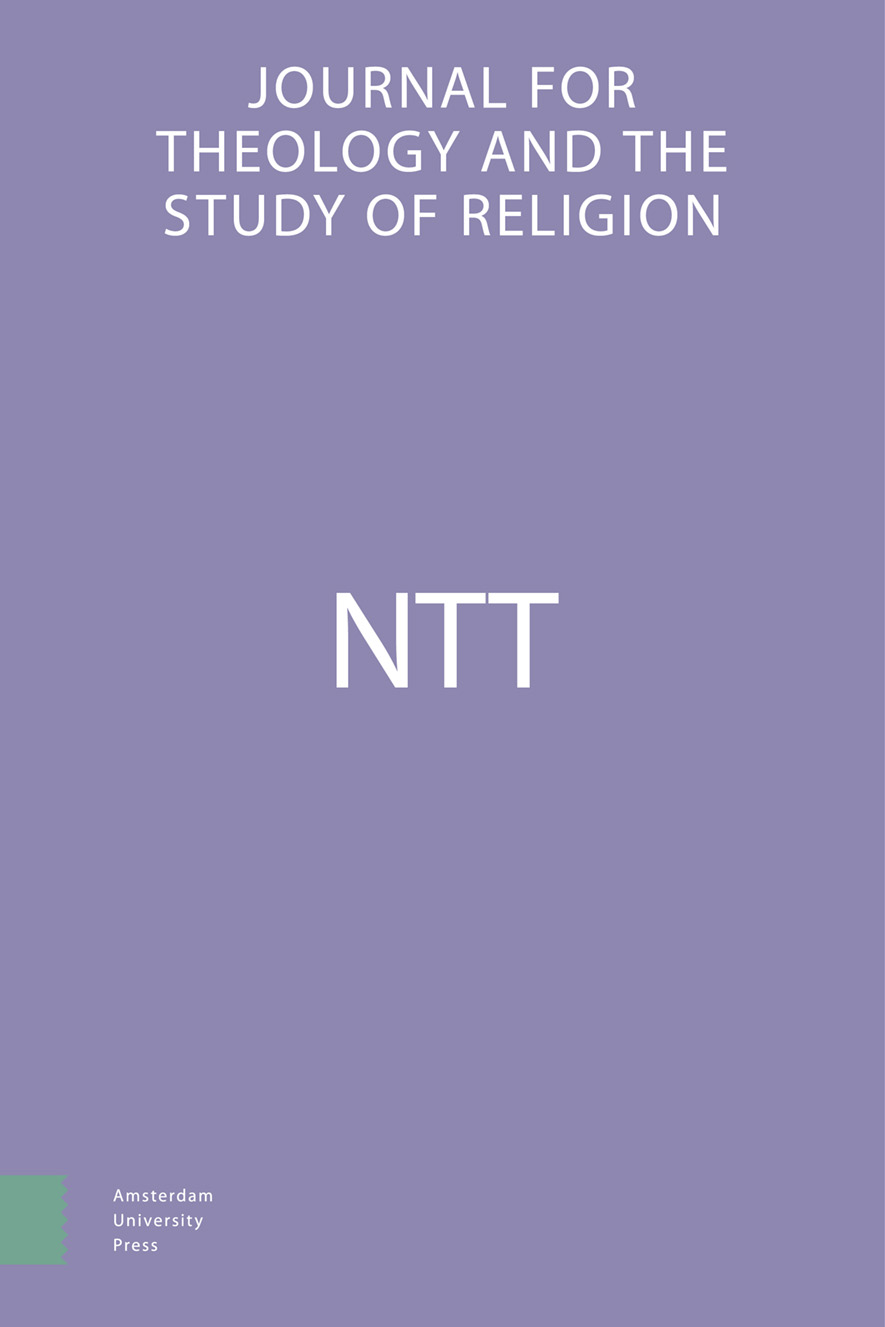- Home
- Publications
- NTT Journal for Theology and the Study of Religion
- Previous Issues
- Volume 76, Issue 1, 2022
NTT Journal for Theology and the Study of Religion - Volume 76, Issue 1, 2022
Volume 76, Issue 1, 2022
-
-
Keeping Theology and Religious Studies Together
More LessAuthor: Marcel SarotAbstractIn this article, I offer some personal reflections on the developments NTT Journal for Theology and the Study of Religion has gone through in recent years. Moreover, I argue that the continuing existence of journals like NTT JTSR is important for three reasons. (1) This type of general journals counterbalances the overspecialization that characterizes today’s universities. (2) Their rootedness in particular geographical areas and political entities makes that this type of journal makes a distinctive contribution to theology and religious studies. (3) It is important that this journal keeps theology and religious studies together in one journal, for in spite of centrifugal forces at work, they belong together.
-
-
-
Revolution statt Religion: Anacharsis Cloots – der atheistische Revolutionär
More LessAuthor: Daniela MuellerAbstractRevolution, not Religion. Anacharsis Cloots – The Atheist Revolutionary
On March 24, 1794, Jean-Baptiste Cloots, a native of Kleve on the Lower Rhine who styled himself Anacharsis, lost his life under the guillotine in Paris. While the reasons for his execution are diverse, one important explanation can be found in his attitude towards religion in antithesis to that of Robespierre. Cloots’, seemingly inevitable development from deist (i.e. a representative of the natural religion in the tradition of Voltaire) to nihilist as well as his correspondingly evolving views on religion and church are very clearly connected to the different stages of his life. This article will, therefore, integrate Cloots’ biography with his religious views to illuminate his struggle against church and religion in antithesis to Robespierre. In retrospect, Cloots was pioneering not only for rejecting revelatory religion but even more so for his rejection of natural religion.
-
-
-
De afbakening, delen en opbouw van Exodus 19:1–31:18
More LessAuthor: Nico RiemersmaAbstractThe Delimitation, Partition and Structure of Exodus 19:1–31:18
Many scholars consider Exodus 19–24 the first great story unit of the last complex of Exodus (19:1–40:38). Concerning this story unit there are three problems: (1) the delimitation, (2) the partition, and (3) the structure of this story unit. Firstly, Exodus 19:1 may form the beginning of the story unit, 19:1 is also the final clause of Exodus 18:1–27. A lot of commentators consider 24:18 the end of this story unit. I, however, argue that there is more reason to see 31:18 as the end. Secondly, the partition of the story units after the introduction (19:1–2c). The reader can distinguish three time-units: (a) 19:2d–8c+19:8d–15; (b) 19:16–20:20+20:21–24:4a; (c) 24:4b–31:18. Thirdly, the structure of Exodus 19:1–31:18 is as follows: 19:1–2c (exposition); A 19:2d–8c (programmatic oracle) + 19:8d–15 (announcement of the coming and descent of Jhwh) → B 19:16–20:20 (coming and descent of Jhwh); A’ 20:21–24:4a (working out of the promised future in the programmatic oracle); B’ 24:4b–31:18 (oracle for the institution of the cultus, in which Jhwh can come).
-
-
-
Erik H. Erikson, Young Man Luther: A Study in Psychoanalysis and History (1958)
More LessAuthor: Hetty ZockAbstractAs part of NTT JTSR’s series on Key Texts, the present article discusses Erik H. Erikson’s interdisciplinary, psychohistorical study of the young Martin Luther, its reception, and its relevance for today. Erikson showed how Luther’s own identity crisis – emerging from the troubled relationship with his father – converged with a crisis in late medieval society and theology, and how being a talented homo religiosus helped Luther to solve both crises at the same time, presenting a “religiosity for the adult man” in accordance with the Renaissance need for autonomy. It is argued that during his psychosocial study of Luther and the latter’s cultural context, Erikson developed a general, existential theory of religion that is also relevant for an understanding of the search for identity and religion in modern times.
-
Volumes & issues
-
Volume 79 (2025)
-
Volume 78 (2024)
-
Volume 77 (2023)
-
Volume 76 (2022)
-
Volume 75 (2021)
-
Volume 74 (2020)
-
Volume 73 (2019)
-
Volume 72 (2018)
-
Volume 71 (2017)
-
Volume 70 (2016)
-
Volume 69 (2015)
-
Volume 68 (2014)
-
Volume 67 (2013)
-
Volume 66 (2012)
-
Volume 65 (2011)
-
Volume 64 (2010)
-
Volume 63 (2009)
-
Volume 62 (2008)
-
Volume 61 (2007)
-
Volume 60 (2006)
-
Volume 59 (2005)
-
Volume 58 (2004)
-
Volume 57 (2003)
-
Volume 56 (2002)
-
Volume 55 (2001)
-
Volume 54 (2000)
-
Volume 53 (1999)
-
Volume 52 (1998)
-
Volume 51 (1997)
-
Volume 50 (1996)
-
Volume 49 (1995)
-
Volume 48 (1994)
-
Volume 47 (1993)
-
Volume 46 (1992)
-
Volume 45 (1991)
-
Volume 44 (1990)
-
Volume 43 (1989)
-
Volume 42 (1988)
-
Volume 41 (1987)
-
Volume 40 (1986)
-
Volume 39 (1985)
-
Volume 38 (1984)
-
Volume 37 (1983)
-
Volume 36 (1982)
-
Volume 35 (1981)
-
Volume 34 (1980)
Most Read This Month

Most Cited Most Cited RSS feed
-
-
How to read Philo
Author: D. T. Runia
-
- More Less

